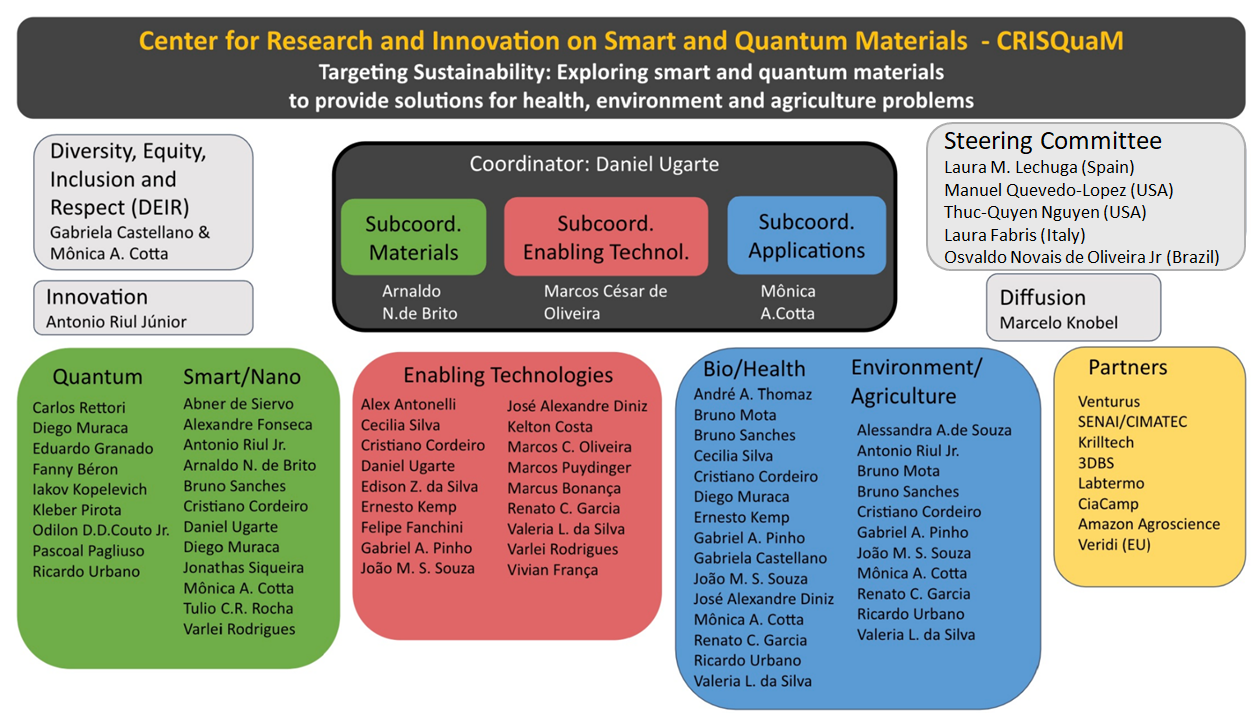BV-FAPESP: research projects supported in this Center
CRISQuaM in the Media: news about the center
CRISQuaM aims to explore the synergistic development of fundamental and applied science to create new materials with high potential for the construction of devices and sensors to address technological challenges related to sustainability, climate change, precision agriculture, ecology, and health. To achieve these goals, we have assembled an interdisciplinary and collaborative research team, integrating expertise across various scientific domains, researching novel materials with high innovation potential. By combining original synthesis methods, advanced characterization techniques, theoretical approaches, computational simulations, quantum technologies, and device construction designs, we aim to drive advances in smart and quantum materials, promoting scientific excellence and technological development. With this, we plan disruptive innovations in instrumentation—including hardware and AI-based tools—as well as in quantum technologies, biomedical devices, and signal processing, in addition to plant bionics, exploring plant-pathogen interactions. Besides research activities, we plan intensive actions in education, dissemination, and communication for the general public, as a modern society should be aware of the challenges humanity faces and how research and technology are essential for responsibly utilizing the planet's limited resources. CRISQuaM's Innovation activities are accelerated through partnerships with several companies in related technologies, many of them Brazilian. Finally, all activities of the Center are managed in accordance with diversity, equity, and inclusion goals and best practices.
The Center brings together scientists, engineers, and innovators in a collaborative effort to apply materials science and quantum technologies at the cutting edge, designing new materials and nano(bio)sensors for advanced diagnostics. The Center has a team capable of producing a wide range of (nano/micro) materials, along with precise chemical and physical characterizations using modern techniques (synchrotron, advanced microscopy, magnetotransport, magnetic resonance, optics, etc.). In addition, the team offers various options in enabling technologies, including miniaturization, processing, and additive manufacturing, as well as instrumentation, quantum sensing, and electronics development. Data analysis will employ updated approaches (numerical simulation, classical and quantum machine learning, and quantum optimization). Applications at the knowledge frontier will address urgent sustainability needs in environmental areas, precision agriculture, plant bionics, and biomedical interfaces, contributing to the development of local technologies in close partnership with the Brazilian industry.
The organization of the Center is based on three pillars — Materials, Enabling Technologies, and Applications — together with partner companies, as described in the figure below.

2025-06-11
Based on individual interviews with adolescents and focus group discussions, researchers from São Paulo State University have created a classification of the coping strategies used by young people in situations of school bullying. The study also provides recommendations for educational institutions.
2025-06-11
Rats that exercised and took fatty acid supplements responded better to bacteria and the inflammatory process of apical periodontitis, which can occur when caries reach the root canal and cause an infection.
2025-06-11
An experiment carried out by researchers at São Paulo State University showed that animals fed a diet enriched with threonine, methionine, and tryptophan were better able to resist health challenges that can compromise weight gain and increase mortality.
2025-06-05
VivaTech is one of Europe's leading technology and startup events; USP and FAPESP will take researchers and disruptive technologies to the event in the areas of health, agriculture, sustainability, and artificial intelligence.
2025-06-04
Booklet summarizes the results of a survey conducted by groups from the Center for Favela Studies and the Laboratory of Urban and Regional Studies and Projects of the Federal University of ABC; the material was presented to the community at a workshop held in February.
2025-06-04
The publication, which resulted from a project conducted at the Federal University of São Carlos, is available in Portuguese and English and has the potential to be an important, low-cost therapeutic and educational tool.